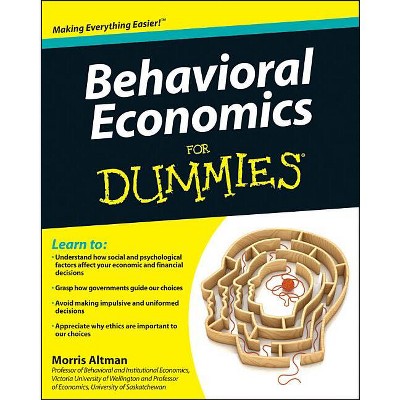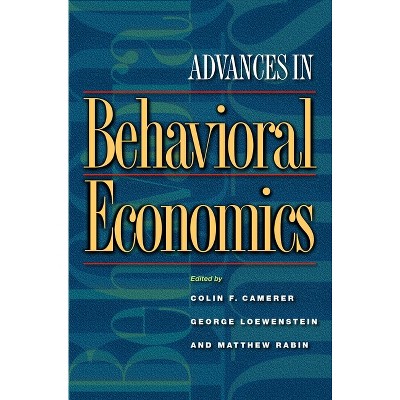About this item
Highlights
- Every leader should know the surprising research and strange conclusions of behavioral economics--for fairness, teamwork and productivity You and your colleagues don't always make rational decisions.
- About the Author: MATTHIAS SUTTER is a behavioral economist.
- 256 Pages
- Business + Money Management, Consumer Behavior
Description
About the Book
"The science of behavioral economics explains the ways people are "predictably irrational." This book helps leaders understand how people "tick", how they react to incentives (monetary or non-monetary in nature) and what that means for working together - or against each other - at work. Understanding people is crucial for success in business and organizational life. But people are weird. The science of behavioral economics can help leaders understand the ways people are "predictably irrational" and what leaders can do about it. This book explains fascinating ways employees react to incentives (monetary or non-monetary) and what that means for teamwork - or working against each other - at work. Modern behavioral economics research is better suited than any other research direction to pursue these questions and provide answers. The author, one of the most influential economists in Germany, has been researching behavioral economics for 20 years and takes you on a journey to summarize for leaders the most important findings in the discpline, both for your own personal career, but also for the people and teams you lead"--Book Synopsis
Every leader should know the surprising research and strange conclusions of behavioral economics--for fairness, teamwork and productivity
You and your colleagues don't always make rational decisions. Sometimes that's a problem that leaders must address, and and sometimes that can be a good thing--when employees put their colleagues interests ahead of their own. Dr. Matthias Sutter, a leading economist from Germany's world-renowned Max Planck Institute explains the latest surprising insights based on behavioral economics research. The book explains how people tick, how they react to incentives (monetary or non-monetary in nature) and what that means for working together--or against each other--at work.
Dr. Sutter summarizes new and classic behavorial science research that applies the everyday business world, so leaders can improve teams and organizations, the research-based way. Find out which factors are important for professional success, from career entry to senior management.
- Start your career on the right footing, advance quicker, and strategize how to meet your goals
- Understand what's holding your colleagues back from productivity and implement evidence-based changes
- Identify hidden biases in yourself and others to overcome inequalities and inefficiencies
- Become a better leader and decision-maker by learning to interpret people's actions
Individuals, organizations, and teams will benefit from the often-counterintuitive wisdom in this book. Based on the author's 20 years of research--plus the findings of the world's top behavioral economists--Behavioral Economics for Leaders can help you get your team and your organization where you want to lead it.
From the Back Cover
DISCOVER WHAT MAKES YOUR COLLEAGUES TICK AS YOU IMPROVE YOUR LEADERSHIP SKILLS AND PRODUCTIVITY WITH INSIGHTS FROM BEHAVIORAL ECONOMICS
Behavioral Economics for Leaders: Research-Based Insights on the Weird, Irrational, and Wonderful Ways Humans Navigate the Workplace is an accessible and unique approach to implementing the many lessons of behavioral economics in your own leadership strategy. You'll explore how and why your team members often don't make rational decisions -- and why that can be a good thing.
Filled with surprising insights and based on solid economic research, the book summarizes the implications of behavioral economics for real-world leadership. You'll learn what makes people tick in the office, how they react to incentives, and what that means for the ways in which we work--or fail to work--together.
The author also shares how to start your own career off on the right track, move up the ladder faster, and effectively strategize about how to meet your own particular career goals.
An essential guide to the timeless wisdom of behavioral economics as it applies to organizational leadership, Behavioral Economics for Leaders will be your ace-in-the-hole for improving the way you navigate the world of work and lead people within it.
About the Author
MATTHIAS SUTTER is a behavioral economist. He has been the Director of the Max Planck Institute for Research on Collective Goods in Bonn since 2017. He is also Professor of Experimental Economic Research at the Universities of Cologne and Innsbruck.












